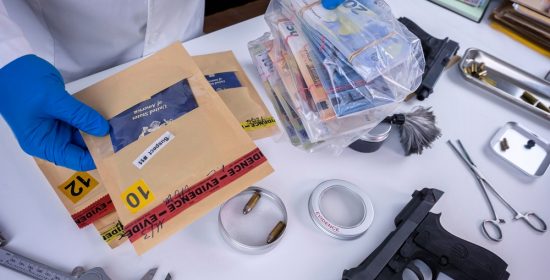Highlights:
- Criminology is the scientific study of crime, criminals, and penal treatment.
- Criminologists examine various aspects of crime, including what causes crime, its impact on society, and methods of prevention.
- A criminologist’s job typically involves tasks such as analyzing evidence, exploring the psychological aspects of crime, and creating reports to help understand criminal behavior.
What is Criminology?
Criminology is the scientific study of:
- crime as a social phenomenon,
- criminals, and
- penal treatment
(This is the simplest definition of criminology, from Merriam-Webster).
Criminology is a field of study that’s rapidly gaining popularity. A quick look at statistics from Data USA shows that in 2021 alone, over 11,000 students earned degrees in criminology, with the average wage for criminology majors being about $100,000.
But what exactly is criminology? And what do criminologists really do?
In this article, we’ll explore criminology as a field, careers in criminology, and the skills and education you may need to pursue them.
Edwin Sutherland, a 19th-century American sociologist and criminologist, is credited with generating the most widely accepted definition of criminology. He defined criminology as the scientific study of the making of laws, the breaking of laws, and society’s reaction to law-breaking. This definition encompasses the key elements of criminology, including the examination of legal systems, the analysis of criminal behavior, and the exploration of societal responses to crime.
Criminology is thus an interdisciplinary field that primarily focuses on understanding criminal behavior and the societal dynamics that inform it. It also examines the causes, correction, and prevention of crime from various perspectives, such as sociology, anthropology, biology, psychology, economics, and statistics.
As explained by Britannica’s entry on the subject, and literature such as ‘Evolution of Criminology’, [accessed via the National Criminal Justice Reference Service (NCJRS)], the origins of criminology as a concept can be traced back to the late 18th century!
Since then, new schools of thought emerged with each era, examining social causes of criminal tendencies, and ways of preventing them. Over time, these ideas evolved, taking social changes and technological developments into account, creating modern-day criminology.
So academic criminology is not a new field that has recently emerged. It’s been around for a while, and has been gaining increasing popularity in recent years.
What Can I Expect to Learn From a Degree in Criminology?
According to the National Center for Education Statistics’ (NCES) Classification of Instructional Programs (CIP), a criminology program is defined as:
A program that focuses on the systematic study of crime as a sociopathological phenomenon, the behavior of criminals, and the social institutions that evolved to respond to crime. Includes instruction in the theory of crime, psychological and social bases of criminal behavior, social value systems and the theory of punishment, criminal law and criminal justice systems, penology, rehabilitation and recidivism, studies of specific types of crime, social attitudes and policy, and applications to specific issues in law enforcement administration and policy.
A criminology program can provide students with a comprehensive understanding of crime and criminal behavior, as well as the social, political, psychological, and other factors that may contribute to it. Here are some of the things you can learn from a criminology program:
- Theories on Crime:
This includes exposure to various theories that attempt to explain why people commit crimes, such as strain theory, social learning theory, and rational choice theory. They will also learn about the strengths and weaknesses of each theory and how they can be applied to real-world situations. - Criminal Justice System:
This subject gives you a better understanding of how the criminal justice system works, including the roles of law enforcement, courts, and corrections. As part of this subject, students also get to learn about the challenges that exist within the system. - Research Methods:
Most criminology programs give students the opportunity to learn about the different research methods used in criminology, such as surveys, experiments, and observational studies. They also get to learn how to analyze and interpret the collected data.
- Applied Criminology:
Some criminology programs focus on the practical application of criminological research to real-world problems. Students may learn about crime prevention strategies, restorative justice practices, and other ways in which criminology can be used to improve the criminal justice system and reduce crime. - Crime and the Media:
Some programs include these courses, covering how the media portrays perpetrators, criminal activity, and the criminal justice system. It examines coverage across topics like race, politics, influencer status, etc. It encourages critical thinking when consuming information from news sources and social media. It also explores how the media may influence criminal behavior. - Sociocultural Context:
A few criminology programs emphasize the importance of understanding how social inequality and diversity affect crime and criminal justice. Through these classes, you can learn how race, class, gender, and other factors may influence crimes and how these are treated by the criminal justice system.
Besides these common courses, you can also expect the curriculum to include several related topics, such as:
- Victimology
- Investigative Techniques
- Crime Scene Analysis
- Applied Data Analysis
- Economics of Crime and Social Problems
- Psychology of Criminal Behavior
- Corrections and Rehabilitation
- Crime and Public Policy
The coursework and curricula may vary with each university and criminology program. Some college criminology programs may also include specific courses in sociology, psychology, political science, forensic science, and other related fields. Additionally, some programs may offer internships or other opportunities for hands-on experience in the field.
If you find these courses interesting, then majoring in criminology might be a great way to start your college journey.

What is a Criminologist? What Do Criminologists Do?
Criminologists study the nature and origins of crimes, social reactions to crime, and the functioning of law enforcement agencies. They also examine relationships between victims and criminals and the role of victims in criminal events (which is referred to as victimology).
Criminologists engage in various tasks that contribute to understanding, preventing, and addressing criminal behavior. While the specific responsibilities can vary based on where they work—whether in academia, research institutions, government agencies, or private organizations—here’s an overview of the day-to-day activities that criminologists may be involved in:
- Research Design and Data Collection:
Criminologists often design and execute research projects to investigate various aspects of criminal behavior. This involves selecting research methodologies, creating surveys, conducting interviews, or utilizing existing datasets to collect relevant information. For example, a criminologist might have to design a survey to assess the impact of community policing on crime rates and then conduct interviews with residents as primary data.
- Data Analysis:
Analyzing crime data is often a core component of a criminologist’s job. They use statistical tools and techniques to identify patterns, trends, and correlations in criminal activities. This analysis helps inform law enforcement, policymakers, and communities about crime dynamics. For example, criminologists may use statistical tools to analyze crime trends in a state and identify hotspots based on the data. This information can then help local law enforcement focus their crime prevention efforts more effectively.
- Crime Prevention Strategies:
Criminologists actively work on developing and evaluating crime prevention strategies. This could include proposing changes to existing policies, implementing community-based initiatives, or advising law enforcement on effective crime prevention tactics.
- Policy Development:
Criminologists contribute to the development and evaluation of criminal justice policies. They may work closely with policymakers, legislators, and law enforcement agencies to shape policies that are evidence-based and address the root causes of criminal behavior.
- Collaboration with Law Enforcement:
Criminologists often collaborate with law enforcement agencies to provide insights into ongoing criminal investigations. They may assist in profiling offenders, analyzing crime scenes, and offering expertise on specific criminal behaviors.
- Expert Testimony:
In legal proceedings, criminologists may provide expert testimony based on their research and analysis. This involves presenting complex criminological concepts in a clear and understandable manner for judges, juries, and legal professionals. For instance, a criminologist might testify in court about the psychological factors influencing criminal behavior, helping the jury understand the complexities of a case.
- Training and Education:
Some criminologists play a role in training law enforcement personnel, criminal justice professionals, students, or community members. This involves sharing insights into criminological theories, crime prevention strategies, and effective approaches to dealing with criminal behavior. They may also actively engage in research to advance academic criminology.
- Community Outreach:
Some criminology jobs may require community outreach or public relations (PR) work. This may involve organizing community events, workshops, or programs to raise awareness about crime issues and encourage community involvement in prevention efforts.
The day-to-day responsibilities of criminologists can vary with each role and organization. Based on where they work, criminologists can have pretty different jobs from each other, which just reflects how diverse the field has evolved to be.
Where Do Criminologists Work?
Crime is hard to control, but the right efforts can be effective in preventing it. There’s a growing need for professionals who can study criminal behavior, research its causes, and formulate prevention methods. As such, there are vast employment opportunities for criminologists in many agencies. Here are a few settings in which criminologists typically work:
Law Enforcement Agencies
Criminologists often play pivotal roles in law enforcement, providing insights into crime patterns, analyzing data, and assisting in criminal investigations. Their expertise enhances the effectiveness of policing strategies.
Government Agencies
Many criminologists find employment in state, federal, and local government agencies focused on justice, public safety, and corrections. This includes roles in policy analysis, program development, and research positions.
Intelligence Agencies
Some criminologists work with intelligence agencies, providing expertise in analyzing criminal activities, understanding patterns, and contributing to national security efforts.
Research Institutions
Academic and private research institutions offer employment opportunities for criminologists to conduct in-depth research, publish studies, and contribute to the academic understanding of criminal behavior.
Nonprofit Organizations
Criminologists often work with nonprofits dedicated to crime prevention, victim advocacy, and community outreach. They may develop and implement initiatives addressing social issues related to crime.
Legal Consulting Firms
Some criminologists serve as consultants for legal firms, offering expertise in criminal law, and behavioral analysis, and providing valuable insights for legal proceedings.
Corrections and Rehabilitation Centers
Employment opportunities for criminologists also exist within correctional facilities, where they contribute to inmate rehabilitation programs, assess recidivism risks, and improve correctional systems.
Corporate Security
Criminologists contribute to corporate security by assessing risks, developing security protocols, and implementing measures to protect businesses from various threats, including white-collar crimes.
Academic Institutions
Criminologists often pursue careers in academia, working as professors, and researchers, and contributing to the education and development of future generations of criminology professionals.
If you’re interested in becoming a criminologist, it’s worth exploring the different settings in which they work. Understanding the varied settings in which criminologists work offers insights into the breadth and impact of their roles. Exploring these settings not only broadens your perspective on the field, but also helps you tailor your career path to align with your specific interests within criminology.
Types of Criminologist Jobs (Plus Sample Job Descriptions)
In the previous section, we’ve seen how diverse the employment opportunities for criminologists can be. As a result of this diversity, there are many different job titles that criminologists might hold. Here are some common types of criminologists in various areas within the field, along with brief descriptions of what they do:
Forensic Criminologists:
- Apply criminological principles to analyze and interpret evidence in criminal investigations.
- Work closely with law enforcement agencies to solve crimes and understand the behavioral aspects of offenders.
Judicial Criminologists:
- Assist in understanding and analyzing criminal cases, providing insights that may be crucial for legal proceedings.
- Collaborate with legal professionals, including judges and attorneys, to ensure a comprehensive understanding of the factors influencing criminal cases.
Research Criminologists:
- Conduct in-depth research on criminal behavior, crime patterns, and related social factors.
- Publish their findings in academic journals and contribute to the advancement of criminological knowledge.
Crime Prevention Specialists:
- Develop and implement strategies to prevent crime within communities or specific environments.
- Often work on proactive initiatives, community outreach, and educational programs to reduce criminal activities.
Correctional Criminologists:
- Concentrate on understanding and improving correctional systems.
- Work within prisons or rehabilitation facilities to assess and address factors contributing to criminal behavior among inmates.
Criminal Profilers:
- Apply psychological and behavioral analysis to create profiles of criminals.
- Work with law enforcement to assist in identifying and apprehending offenders based on their behavioral patterns.
Juvenile Justice Specialist:
- Concentrate on understanding and addressing criminal behavior in juveniles.
- Work within the juvenile justice system to develop programs and interventions aimed at rehabilitation.
Environmental Criminologist:
- Examine how environmental factors contribute to criminal behavior.
- Analyzes the impact of urban design, social structures, and community dynamics on crime patterns.
These are just a few examples of positions that criminologists may hold. The field of criminology offers a wide range of specialized roles that cater to diverse interests and expertise. It would be wise to invest time researching the branches that appeal to you most. This will give you a clearer picture of the landscape and requirements for the roles you’re most interested in.
Here are sample criminologist job descriptions to help you get a better understanding of what employers look for, and what you can expect while searching for jobs in this field:
—————————————————————————————————————
1. A Generic Criminologist Job Description Template
Job Title:
Criminologist
Overview:
We are seeking a highly skilled and motivated criminologist with excellent research skills. You will play a key role in analyzing criminal behavior, researching crime patterns, contributing valuable insights, and collaborating with law enforcement.
The ideal candidate will have a strong background in criminological theories, excellent analytical skills, and the ability to collaborate with multidisciplinary teams.
Responsibilities:
- Gather and analyze data about the causes and nature of crime to determine criminal patterns.
- Research and analyze the biological, social, and psychological backgrounds of criminals.
- Develop profiles of criminal types to assist law enforcement in identifying potential criminals, understanding their behavior, and apprehending them more efficiently.
- Examine crime scenes, evidence, and autopsies to determine what happened and which profile category the criminal falls into.
- Prepare reports and statistics of research findings for future reference.
- Assist law enforcement and the justice system with developing crime prevention strategies and reform policies based on findings.
Requirements:
- Bachelor’s degree in criminology, sociology, or related field.
- Excellent research and communication skills.
- Strong critical thinking abilities.
- Computer skills and knowledge of relevant software.
—————————————————————————————————————
2. Job Description for a Federal Judicial Criminologist
Job Title:
Federal Judicial Criminologist
Overview:
We seek a Criminologist – Federal Judicial Criminologist to support an engagement for an administrative agency of the United States federal court system established as the central support entity for the federal judicial branch.
The role is focused on providing solutions to achieve the mission of nonjudicial, administrative business of the United States Courts, such as maintaining statistics and managing Court budgets. Should be able to assist staff in redesigning pretrial services bond reports in a way that reframes the information to accurately reflect a person’s risk without including non-relevant information.
Minimum Qualifications:
- Experience in criminal justice or related setting, such as criminology, social justice, or other legal/criminal-related field.
- Basic knowledge of federal law and the criminal justice system, particularly as it relates to community corrections, federal pretrial services, probation and parole policies, and procedures.
- Bachelor’s Degree
- U.S. Citizenship Required
- Excellent oral and written communication skills
- Proficient with Microsoft Office Products (Microsoft Word, Excel, PowerPoint, Publisher, & Adobe)
Core Competencies:
- Teamwork – ability to foster teamwork collaboratively as a participant, and effectively as a team leader
- Leadership – ability to guide and lead colleagues on projects and initiatives
- Business Acumen – understanding and insight into how organizations perform, including business processes, data, systems, and people
- Communication – ability to effectively communicate to stakeholders of all levels orally and in writing
- Motivation – persistent in pursuit of quality and optimal client and company solutions
- Agility – ability to quickly understand and transition between different projects, concepts, initiatives, or work streams
- Judgment – exercises prudence and insight in the decision-making process while mindful of other stakeholders and long-term ramifications
- Organization – the ability to manage projects and activities, and prioritize tasks
—————————————————————————————————————

How to Become a Criminologist
Whether your interest lies in law enforcement, research, or policymaking, the road to becoming a criminologist can be challenging. But few other jobs can be as rewarding as that of a criminologist. To become a criminologist, you typically need to follow these steps:
1. Education
Most criminologist roles require you to earn a bachelor’s degree in criminology, sociology, psychology, criminal justice, or a related field. Some universities offer undergraduate degrees specifically in criminology, while others offer broader areas of study that can serve as a foundation for a career in criminology. The educational requirements can vary greatly with each role and agency, but the typical entry-level requirement is a bachelor’s degree. (In the next section, we’ll explore the many programs that could lead to criminology careers).
2. Gain On-the-Job Training and Experience
Seek internships or volunteer opportunities while in school to gain practical experience and exposure to the field. This can provide valuable insights and help build a network of professional contacts. Many criminologists start their careers as assistants or junior criminologists, where they receive training and prepare for increased responsibilities. As they progress, they may participate in policy and procedure discussions, analyze data, and contribute to the development of crime prevention strategies and reform policies.
Many college programs and even local law enforcement agencies organize initiatives for students to gain familiarity with the law enforcement system. Through these initiatives, ride-alongs, internships, or volunteer opportunities, you can gain relevant experience during your college education.
3. Consider Further Education
Consider pursuing a master’s degree or even a doctorate in fields such as behavioral science, criminology, sociology, psychology, or criminal justice. While this is usually not a requirement, a higher degree can lead to better positions, responsibilities, and pay.
In academia and research, a doctorate is often recommended, if not required. Many executive roles also often require a master’s or higher degree. As with everything else, this differs with each role and agency, so it’s advisable to invest time in research before investing in further education after earning your undergraduate degree.
4. Obtain Licensure
In most states and with most law enforcement agencies, passing a written examination and earning a license is required to work as a criminologist. This is typically separate from any degree in criminology or a related field. Licensure requirements vary, but typically involve having US citizenship, passing physical and written examinations, background checks, psychometric evaluations, etc.
These steps provide a general outline of the educational and professional path to becoming a criminologist. It’s important to note that the specific requirements and career paths may vary based on individual circumstances and different roles.
What Degree Do You Need to Be a Criminologist?
The first step to becoming a criminologist is pursuing the right education. There are many different educational paths that can provide the necessary knowledge for a successful career in criminology. Here are popular fields of study that can prepare you to be an efficient criminologist:
Criminology
Pursuing a degree specifically in criminology offers in-depth insights into the causes and consequences of crime. This program often covers theories of crime, criminal justice policies, and research methods relevant to the field.
Criminal Justice
A degree in criminal justice (CJ) is a direct pathway to becoming a criminologist. This program covers the fundamentals of law enforcement, legal systems, and criminal behavior, providing a strong foundation for a career in criminology. Some colleges offer combined criminology and criminal justice (CCJ) programs that blend aspects of both majors. Criminal justice degrees are a popular option for those looking to get law enforcement jobs.
Criminalistics or Forensic Science
For those interested in the scientific aspects of crime investigation, a degree in criminalistics or forensic science can be beneficial. This program focuses on techniques for collecting and analyzing physical evidence, complementing the investigative side of criminology.
Related: Criminology vs. Criminal Justice vs. Criminalistics: Explained
Sociology
A degree in Sociology provides a broader perspective on human behavior and societal structures. This background is valuable for understanding the social factors influencing crime and contributes to a well-rounded criminological education.
Psychology
Understanding the psychological aspects of criminal behavior is a valuable skill for aspiring criminologists. A degree in psychology equips you with insights into human motivation, mental health, and behavioral patterns.
Related: How Long Does it Take to Get a Psychology Degree?
Law Enforcement Administration
This degree provides a strong foundation in law enforcement principles, policies, and administration. It’s particularly suitable for those interested in combining managerial skills with a deep understanding of criminal justice.
Public Administration
Public administration degrees offer a broader view of governance and public policy, which can be advantageous for criminologists involved in shaping and implementing crime prevention strategies at the policy level.
Data Science or Statistics
In modern criminology, a background in data science or statistics can be valuable for criminologists. It enhances your ability to analyze and interpret crime data, contributing to evidence-based decision-making.
Social Work
Social work degrees provide insights into working with diverse populations, including those impacted by crime. This knowledge is beneficial for criminologists involved in rehabilitation and community outreach.
Related: Human Services vs. Social Work
Political Science
A degree in political science can help aspiring criminologists gain an understanding of the political aspects of criminal justice policies and legal systems. This knowledge is valuable for criminologist careers related to policy analysis and reform.
The educational requirements for criminologist jobs may vary greatly with each agency and location. Some employers may prefer candidates with specific degrees. It’s best to research the roles you’re aiming for and find programs that can help you secure them. Our free college match tool can help with the latter!
When pursuing any of these degrees, consider supplementing your academic studies with internships, research opportunities, or practical experiences in the field of criminology to enhance your skill set and employability.
Salary and Job Outlook for Criminologists
While pursuing higher education in criminology, it’s a good idea to research the job market. This can better prepare you for the challenges that may lie ahead after graduation. Here’s a breakdown of the job outlook and salary for criminologist roles, compiled from various reputed sources:
| Source | Average Salary / Median Pay |
| US Bureau of Labor Statistics (BLS) | $98,590 per year / $47.40 per hour (median pay, 2022) |
| ZipRecruiter | $81,173 per year / $39.03 per hour (average salary, November 2023) |
| PayScale | $59,459 (average salary, 2023) |
| Glassdoor | $56,867 per year (estimated total pay, 2023) $54,008 per year (average salary, 2023) |
| Zippia | $49,638 per year (average salary, 2023) |
- Data from the US Bureau of Labor Services (BLS) shows that career opportunities for sociologists, which includes criminologists, are expected to increase by 5% from 2022-2032. The median pay for sociologists, including criminologists, in 2022 was $98,590 per year or $47.40 per hour.
- According to ZipRecruiter, as of November 2023, the average annual pay for criminologist jobs in the US was $81,173 a year, approximately $39.03 an hour. The majority of criminology salaries for 2023 ranged between $62,000 to $94,500, with top earners making $132,000 annually across the states. The average pay range for criminology jobs varies greatly, which suggests there may be many opportunities for advancement and increased pay based on skill level, location, and years of experience.
- Based on 23 salary profiles analyzed by PayScale, the average salary for a criminologist was $59,459 in 2023.
- According to Glassdoor, the estimated total pay for a Criminologist I role is $56,867 per year, with an average salary of $54,008 per year.
- According to Zippia, criminologist jobs are in demand. This demand for criminologists is projected to grow by 5% from 2018 to 2028. The average salary for criminologists in 2023 was approximately $49,638 per year.
While accurate as of 2023, this information may vary over time, and for each specific job in the field. Understanding the job outlook and salary for specific criminology careers is a recommended step for all students considering criminology majors. It can help you get a better sense of the job market, and how to navigate the field after graduation.
What Skills Do You Need for Criminology Jobs?
Criminology jobs demand a unique set of competencies, blending analytical prowess with a deep understanding of human behavior and societal dynamics. Here are some of the core skills employers look for while recruiting for roles in this field:
- Analytical Skills
- Research Skills
- Critical Thinking
- Effective Communication
- Empathy
- Tech Savviness
- Ethical Decision-Making
- Collaborative Skills
No matter where you want to work, building these skills will definitely prepare you to be a better criminologist. In addition to these skills, you should also aim to develop industry-specific knowledge for the areas you’re interested in. For instance, if you aim to be a juvenile justice specialist, you should study the juvenile justice system, child psychology, and laws related to juvenile justice.
Alternate Careers for Criminology Majors
While a degree in criminology naturally aligns with roles as criminologists, in law enforcement and criminal justice, the skill set you acquire can open doors to a variety of alternative career paths. Here are some compelling options for criminology majors seeking diverse professional avenues:
Private Investigators or Detectives
Criminology majors actively apply their investigative skills in the realm of private investigation. Whether assisting individuals, corporations, or legal firms, they bring a unique perspective, excelling in research, evidence gathering, and information analysis.
Related: How to Become a Detective
Social Workers
In the field of social work, criminology majors actively harness their understanding of human behavior. Equipped with insights into societal dynamics, they can make a difference by working with at-risk populations, victims, or those in need of support and rehabilitation.
Related: How to Become a Social Worker
Cybersecurity Analysts
Transitioning into cybersecurity, criminology majors actively leverage their understanding of criminal behavior and investigative techniques. They play a crucial role in protecting digital assets and sensitive information from the rising threat of cybercrime.
Forensic Accountants
As forensic accountants, criminology majors actively combine financial expertise with criminological insights. They investigate financial irregularities, track illicit transactions, and contribute to legal proceedings, utilizing a unique perspective. Degrees in finance and accounting are sometimes required for these roles.
Legal Consultants / Paralegals
Criminology majors actively serve as legal consultants, applying their knowledge to assist attorneys in understanding criminal behavior, analyzing cases, and providing expertise on matters related to criminal law. This often requires pursuing legal studies programs, but a criminology major can be a great foundation if you’re looking to advance in this field.
Related: How to Become a Paralegal
Probation Officers
Actively playing a vital role in the criminal justice system, criminology majors often help individuals reintegrate into society as probation officers. They monitor progress and offer support for rehabilitation based on their background.
Corrections Officers
Contributing to the rehabilitation of individuals within the criminal justice system, criminology majors often become corrections officers. They manage correctional facilities, ensuring a secure and supportive environment for inmates.
Academic Research and Teaching
Criminology majors actively share their knowledge and passion through academia. They often conduct research, contribute to advancements in the field, and inspire the next generation as criminology or criminal justice professors.
To Sum Up
Criminology is a diverse field. Majoring in criminology can prepare you for many rewarding roles, including that of a criminologist. Criminologists work in different areas within the criminal justice system, studying criminal behavior and working to prevent it. A criminology degree can also open doors to career opportunities beyond criminology roles.
So whether you’re interested in understanding criminal minds, shaping policies for safer communities, or contributing to research, a degree in criminology or related fields might be the answer you’re looking for. As always, we recommend investing as much time as you can researching the specific areas that interest you before making a decision. College can be exciting, and a career in criminology even more so!
Frequently Asked Questions(FAQs)
Absolutely! Many reputable institutions offer online criminology degree programs, providing the flexibility to pursue your education remotely. Most online criminology degrees cover the same comprehensive curriculum as traditional on-campus programs.
‘Criminal Justice’ is a broad umbrella term used by many universities and colleges to refer to all their degree programs related to criminal and legal studies. However, in professional settings, criminology and criminal justice are distinct disciplines.
Criminology primarily focuses on the causes of crimes and criminal behavior.
Criminal justice mainly centers around the study of the justice system—law enforcement, the judiciary, corrections, etc.
Criminology is a popular major for students considering law school. Studying criminology offers many benefits for those considering law school, as it provides an introduction to law, exposure to court proceedings, and the corrections system. However, simply earning a criminology degree is not enough to become a lawyer. To practice law, you will need to attend law school, take the bar exam, and be licensed by your state’s bar association.



